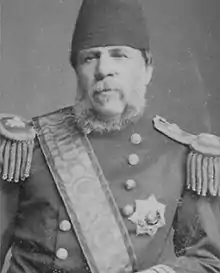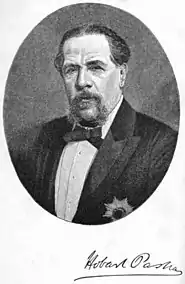Augustus Charles Hobart-Hampden
Augustus Charles Hobart-Hampden (1 April 1822 – 19 June 1886) was an English-born Ottoman admiral (hence widely known as Hobart Pasha).
Hobart Pasha | |
|---|---|
 | |
| Birth name | Augustus Charles Hobart-Hampden |
| Born | 1822 |
| Died | 1886 (aged 63–64) |
| Allegiance | |
| Service/ | |
| Rank | Admiral |
| Battles/wars | Russo-Turkish War (1877–78) |
Biography

Hobart-Hampden was born in Leicestershire, the third son of the 6th Earl of Buckinghamshire.[1]
In his youth, he was educated at King Edward VI Grammar School, Louth, Lincolnshire.
In 1835 he entered the Royal Navy and served as a midshipman on the coast of Brazil in the suppression of the slave trade, displaying much gallantry in the operations. In 1855 he took part, as captain of HMS Driver in the Baltic Expedition, and was actively engaged at Bomarsund and Åbo.[1]
In 1862 he retired from the navy with the rank of post-captain; but his love of adventure led him, during the American Civil War, to take the command of a blockade runner. He had the good fortune to run the blockade eighteen times, conveying war material to Charleston and returning with a cargo of cotton.[1]
In 1867 Hobart entered Ottoman service, and was immediately nominated to the command of that fleet, with the rank of "Bahriye Livasi" (rear-admiral). In this capacity he performed splendid service in helping to suppress the insurrection in Crete, and was rewarded by the Sultan with the title of Pasha (1869). In 1874 Hobart, whose name had, on representations made by Greece, been removed from the British Navy List, was reinstated; his restoration did not, however, last long, for on the outbreak of the Russo-Turkish war he again entered Ottoman service.[1]
On the conclusion of peace Hobart still remained in Ottoman service, and in 1881 was appointed Mushir, or marshal, being the first Christian to hold that high office. He died at Milan on 19 June 1886 and was brought to Istanbul and buried at English Cemetery in Selimiye.[1]
References
-
 One or more of the preceding sentences incorporates text from a publication now in the public domain: Chisholm, Hugh, ed. (1911). "Hobart Pasha". Encyclopædia Britannica. 13 (11th ed.). Cambridge University Press. pp. 543–544.
One or more of the preceding sentences incorporates text from a publication now in the public domain: Chisholm, Hugh, ed. (1911). "Hobart Pasha". Encyclopædia Britannica. 13 (11th ed.). Cambridge University Press. pp. 543–544.
External links
| Wikimedia Commons has media related to Augustus Charles Hobart-Hampden. |
- O'Byrne, William Richard (1849). . . John Murray – via Wikisource.
- Works by Augustus Charles Hobart-Hampden at Project Gutenberg
- Works by or about Augustus Charles Hobart-Hampden at Internet Archive
- Works by or about Hobart Pasha at Internet Archive